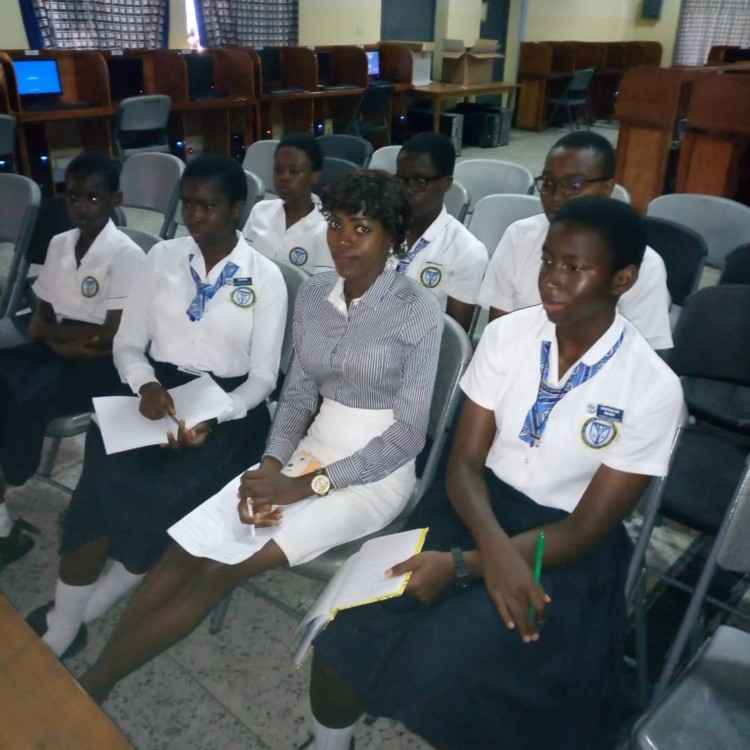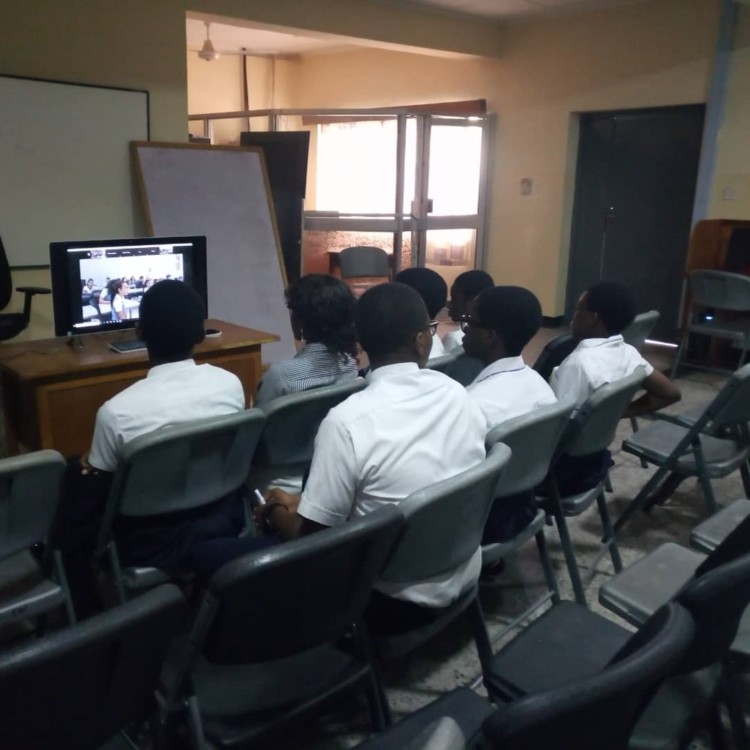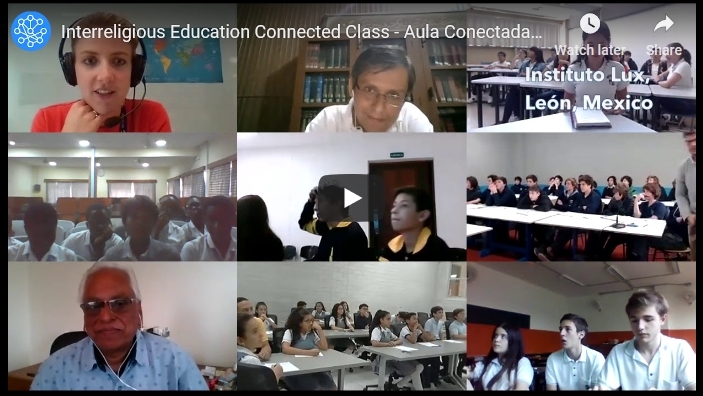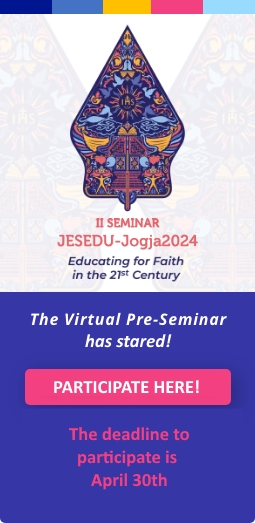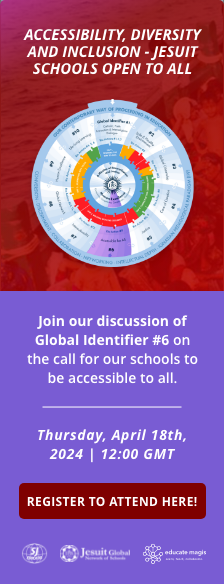With 6 schools from 4 different countries and 2 experts from different parts of the world this Connected Classroom gave us a sense of what it might be like to engage in Interreligious Dialogue.
Last Thursday we hosted a Connected Class on the topic of Interreligious Education. We were very lucky to have two wonderful experts on the topic facilitating the classroom, sharing their experiences and knowledge and answering questions from the students who participated. The experts who joined us were Fr. Vincent Sekhar SJ, and Fr. Juan Carlos Pallardel, SJ.
Fr. Vincent is originally from India and is now living in San Francisco (where it was 8 am when we started) and Fr. Juan Carlos is originally from Peru and currently living in Pakistan (where it was 8 pm when we started). The schools who participated in the Connected Class were:
- Instituto Lux, León, Mexico
- Colegio San José, Barranquilla, Colombia
- Colegio San Ignacio de Loyola, Medellín, Colombia
- Colegio San Francisco Javier, Pasto, Colombia
- Colegio del Salvador, Buenos Aires, Argentina
- Loyola Jesuit College, Abuja, Nigeria
Fr. Vincent spoke to us about the fact that religion is very much linked to our sentiments and emotions so it can be quite a personal and sensitive topic. Which is why it is so important to be open-hearted when we speak and learn about religions.
When we talk about Interreligious Education, learning inter-religiously, we refer to learning from different religious traditions – about their beliefs, practices, gods, goddesses, sages, saints, prophets, rituals, worship, ethics, morality, etc.” Fr. Vincent Sekhar SJ
Vincent spoke about how Interreligious Education helps us to see how people of other religions are connected to the world around us (nature, environment), how they see and relate to other people and how they are in the world.
It is important to know and understand your own religion well to be able to engage in positive dialogue with others about their religion and your religion. Interreligious education provides a platform for coming together and for greater understanding, acceptance and tolerance. Interreligious education has a specific goal of building community, of love, of friendship, of sharing. It is a wonderful opportunity to learn from others!” Fr. Vincent Sekhar SJ
Fr. Juan Carlos spoke about his experience of coming from a predominantly Christian country to living in different Muslim countries for the last 10 years and what he has learnt from this experience. He highlighted the importance of listening to others and being curious and open to learning from others.
A curious heart and a curious mind will help us to want to meet, get to know and really listen to people of other faiths and religions. And when we meet these people, we realize that we have many things in common but that we are also different. And when we come to this realization, we have at least two choices; we can run away and stay with what we know, or we take the risk and dare to get to know the other person in their difference. And for this is important to really listen. Fr. Juan Carlos Pallardel, SJ
The students from the different schools took turns asking Vincent and Juan Carlos questions and sharing their observations. The Head Girl from Loyola Jesuit College remarked on the fact that there are many more things to unite us than to divide us. This was something which resonated with her experience at school of being friends with students of other religions.
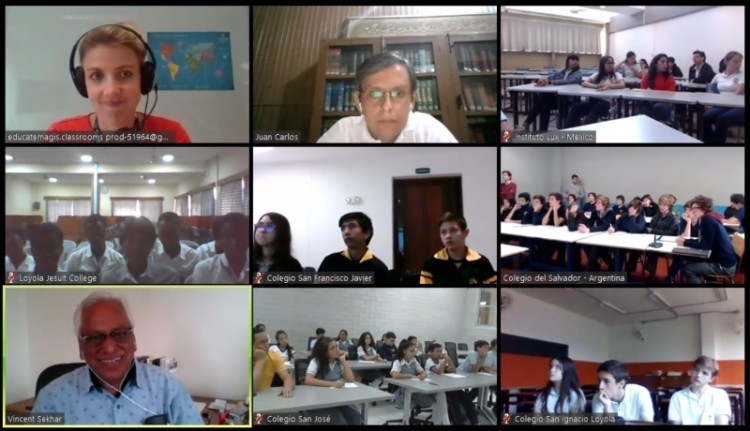
A student from Colegio San José asked about whether Intercultural Education can help us to become Global Citizens, as Global Citizenship is a ‘hot topic’ in many schools at the moment.
In response to a question from a student in Instituto Lux about what tolerance means, Fr. Juan Carlos shared that while tolerance is an important first step in respecting the other, it is not enough. In order to really engage in Interreligious dialogue and education we need to move beyond tolerance and really come together.
There were other great questions and conversations, for example on how to work with the belief of each religion that their God is the only God.
Throughout the connected class, the importance of listening to others, of being open to others, of trusting others, of learning, sharing and collaborating was highlighted. With 6 schools from 4 different countries and 2 experts from different parts of the world this class gave us a sense of what it might be like to engage in Interreligious Dialogue.
Speaking about the experience,
Ms. Queen Vincent from Loyola Jesuit College, Abuja, Nigeria said:
Interacting with the experts and some students of other Jesuit schools around the world felt so surreal! The students were so excited to have been part of the class as it has opened them up to new knowledge and has birthed more curiosity in them thereby strengthening the already established lived dialogue they are experiencing in the boarding school as they share the same space with students from other religions”.
Students from Instituto Lux said:
I like the friendly language that the specialist used”
“I was in shock when they connect the religion with the environment and how we can be a better person if we believe in something. It is amazing that all the different religions and cultures can live in peace”
“For me this conference was helpful because in one hand we could know other people and in the other hand we learn more things listening to different points of view”
“The thing that I liked the most was talking about other types of religions”
Students from Loyola Jesuit College, Abuja, Nigeria said:
When I was younger I was convinced that Christianity was the only religion that was practised in the world. But as I grew older I became more informed and realized that other religions existed, I then began to think that those religions had what the Bible referred to as ‘false gods’.
The connected classroom I was privileged to attend on Thursday, 23rd May 2019, opened my eyes and my mind to understand that there may be many religions in the world with their various values and teachings but they are all connected in the sense that the foundation for each and everyone of them is faith in a Supreme Being. The different names we give to this Being does not change who He is to us. The talk given on interreligious education has helped me realize that instead of focusing on the differences between us we should understand that we are all one in Him.
Before the seminar, I had not really put much thought into the fact that I have always studied in a multi-religious school, I had never considered the significance of living in a country where many different religions are practised, and I had never been curious about other religions other than fleeting moments of curiosity. Okonkwo Chiagoziem
“The seminar was truly an eye-opener. It made me realize the privilege I have to have been able to mix freely with different students with different religious backgrounds and even befriend some of them. I have more drive to learn more about the different religions of the world, especially those that people around me follow because I know that these beliefs shape society and affect my own life.
I would never have brought up religious beliefs with my non-Christian friends before because I always considered religion a touchy and unsafe subject. Now, I feel more curious about discovering what they believe, how it is similar to what I believe, how it is different from what I believe and how I can identify God’s truth in it. Even if interreligious education is not formally introduced into the secondary school curriculum in my school, Nigeria, I can play my own part to be knowledgeable about one of the most pivotal aspects of the human society. Ojuba Mezisashe
“There are many things to unite us than to divide us.” These are the words of Fr. Vincent Sekhar SJ which stood out most for me from his talk on interreligious education.
Religious education involves molding people into a particular religion. Our religion really affects the way we think and see things. Religious education may come in the form of Catechism classes in the Catholic Church. It may eventually make people feel that their religion is superior to other religions.
Religion has become a major cause for misunderstandings and violence in the world today as people view their religions as better than others. This calls for interreligious education which involves learning the ethics, morals and commandments of other religions and how they are connected to the rest of the world.
Interreligious education is necessary as it helps to clear doubts we may have about other religions. To engage in interreligious education, one needs to be inquisitive to learn about other religions. If one is not curious, one will be satisfied with the little he or she knows. One also needs to be tolerant and should be able to communicate. Tolerance alone may not help in achieving interreligious education as tolerance is basically just respecting the other person’s religion. However, tolerance opens the door for communication between religions to occur.
Through interreligious education, we learn that religions which may have been written off as ‘not acceptable’ may have things in common with our religion. It is through interreligious education that we can unite as children of the one, true God. UMEH, Somtochi. SS2A
Colegio San José shared a short article and a video in Spanish about their perspective of the experience. Click here to read.
Here is a short clip of some interesting conversations during the Interreligious Education Connected Classroom. Enjoy!
To video this video clip with subtitles in Spanish follow this link Video Aula Conectada en Educación Interreligiosa
Thank you to all the schools who participated in this Connected Class and a special thank you to Fr. Vincent and Fr. Juan Carlos for their time and knowledge. If you are interested in participating in another virtual classroom like this with your students, please leave a comment below!
